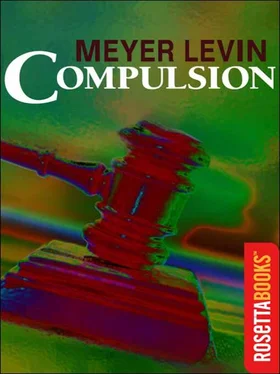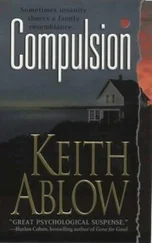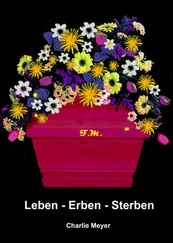But what idea of McNarry’s was he talking about? I asked.
Why, hadn’t I known? Just after the trial Dr. McNarry had suggested a wonderful idea to all three families – the Kesslers, the Strauses, the Steiners. After all, they were linked in the tragedy; each had lost a son.
Dr. McNarry had proposed that the three bereaved millionaire families set up a joint fund for the study of mental diseases. “A great research centre in Chicago.”
“He proposed it to all three families?” I asked.
“I think it came fairly close, at that. Paulie Kessler’s father saw it. You know, that little man had a great deal to him.” And Artie’s mother had been most eager for the plan. “I suppose it would have relieved poor Mrs. Straus of some of her guilt feeling to have her tragedy acknowledged in that way.”
But real opposition, Willie said, had come from Randolph Straus, who could not bring himself to have his son’s crime thus perpetuated.
“What a pity, what a waste of great material!” Willie said. The first task would have been a depth study of the crime itself. “After the sentence, they could really have gone into all that material that didn’t come out.”
What material? Was he going to tell me, even now, something of the mysterious crimes, A , B , C , D ? Had Willie after all known something? I felt a curious reluctance to be drawn into the whole thing again, but I had to face the story. “Was there really more?”
It was a different kind of material that he meant. Interpretive material.
I recalled that he himself had tried an explanation and had brought up some strange theories. The chisel, the tool – but something else came back to me from that long-ago discussion with Willie. Two things he had mentioned, the tool and the burial place. About the second one I had never understood. The tool had been Artie’s idea. But Judd had picked the swamp.
“That’s it,” Willie said. “That was Judd’s part. Artie, the tool. Judd, the receptacle.” Was the whole act, then, a symbol? Willie must have felt my resistant bepuzzlement, for he took another approach. “Do you know about the death instinct?” All life was a struggle with the death-wish, and we had seen the victory of that wish in the cases of Judd and Artie.
“Don’t we always tend to fit events into the latest theory we have acquired?” I said.
“Why did Judd pick that particular place?” Willie resumed.
“The swamp? He was familiar with it. He went birding there.”
“He went birding in a lot of other places. Something impelled him to go to that particular spot, instead of the dunes or the lake or anywhere.” Artie, for instance, must have used other places at other times – if one accepted that there had been other crimes for Artie. Yet this time it was Judd who insisted he knew the exact spot.
“All right,” I said. “Why did he pick Hegewisch?”
“It’s not Hegewisch – it’s the particular spot there.”
“Under the tracks?” I said. “The cistern?” That had indeed always seemed peculiar to me, for it was obviously a not very safe hiding place.
“Well?” Willie demanded. “Don’t you see what it represents?”
I thought of the hole, the white concrete pipe, and it represented nothing to me.
“The cistern.” He was staring at me until I thought, yes, perhaps Willie was a little like Judd and Artie, possessed by his own brilliant mind. “A naked body in the cistern,” he said. “It was a pretty tight fit, wasn’t it, and the fluid, the body in an aqueous environment, a slow amount of fluid flowing through the cistern-”
I stared back at him, beginning to feel his meaning.
“How many times did Judd say he wished he’d never been born?”
I knew his meaning, then, and rejected it completely, almost revolted by it, even while – all the more revolting, like an obscenity – my mind kept adding the picture of the bushes screening the entrance to the pipe.
As though forgiving my slowness in apprehension, Willie became torrential. I had to picture Judd as a baby. The last baby of a mother who had become an invalid through his birth. His mother had paid such a price for having him – her life, everyone believed.
“Remember, this idea became overt with him. He told Dr. Allwin that he felt he had killed his mother because her illness stemmed from his birth. But what he actually meant, what he couldn’t say was that he felt his father had killed her, through the male demand on her.”
“You got that far last time,” I recalled, “including his Madonna fixation, as a way of getting rid of his father.”
“Yes,” Willie said, but since then, there had been some interesting ideas on the myth of virgin birth. Making the mother a goddess and a virgin – wasn’t that a perfect barrier against incest wishes in the boy? Wasn’t Judd particularly attached to his mother? And as he grew up, wasn’t his fear of having anything to do with women a fear of using them, and therefore an incest-fear of using his mother, of hurting his mother?
“Yet he wanted to kill a woman,” I objected. “It was his idea that the victim should be a girl.”
“The complement of over-tenderness is over-violence,” Willie responded. “But there was even more to it, about wanting to kill a girl.”
He came to it, through all of Judd’s history. Hadn’t his mother wanted this last baby to be a girl? So she virtually made Judd into a girl. “She sends him to a girls’ school. The report said the old man wanted boys to be boys – but the mother was crazy for neatness and cleanliness. Here is where you get a couple of the characteristics that show up in Judd. All this feminine passion for order, for having things in their place. You see the conflict growing in him – is he a girl or a boy? And there was that terrific thing, when he got to public school, about not using the toilet. Holding himself in! The sissy from the girls’ school! And that’s just when he tells us he started teaching himself never to have any emotions, to hold it all in! Well, where is it you don’t feel anything at all?”
Did he mean death? Then the other state echoed to me. We had just talked of how often Judd repeated it. He wished he never had been born .
We were walking more slowly. “Then he goes to Twain. He’s odd and sickly and always erupting all over with skin diseases, he’s allergic, he can’t stand the world. He’s a lone kid, the crazy bird, the last one they mention in the school annual – well, hell, we all knew Judd by then. I was older than he, but we all knew he was supposed to be queer, nasty, conceited, all that. Now, he develops his mania for languages and for birds. The languages – what’s language but communication? He couldn’t communicate with anybody. He had no close friends. He was looking for the key, the way to communicate, the universal language. And the birds, I haven’t quite got it – flight, you know, is commonly a sex symbol – wait a minute!” Willie halted, cocked his head. “What was the first bird he was looking for?”
I must have looked stupid.
“A child, watching birds. What bird does any little child wonder about first of all? The stork. He’s sceptical. Allwin reported when the nurse first told Judd the stork story, Judd said she had a sneer on her face. So he asked his father and the father said babies were bought in stores. Little Judd was going to find out who was right. He began watching for birds, to solve the great mystery that all children feel compelled to solve. Even in Hegewisch, he was still a child watching for the stork.”
I must have looked dubious, because he said, “All right. Put that aside. We’ll see. Take him from Twain. That’s when he began to get these crushes, first on his brother in uniform, then on a camp-counsellor, and then he fixed on Artie-”
Читать дальше












